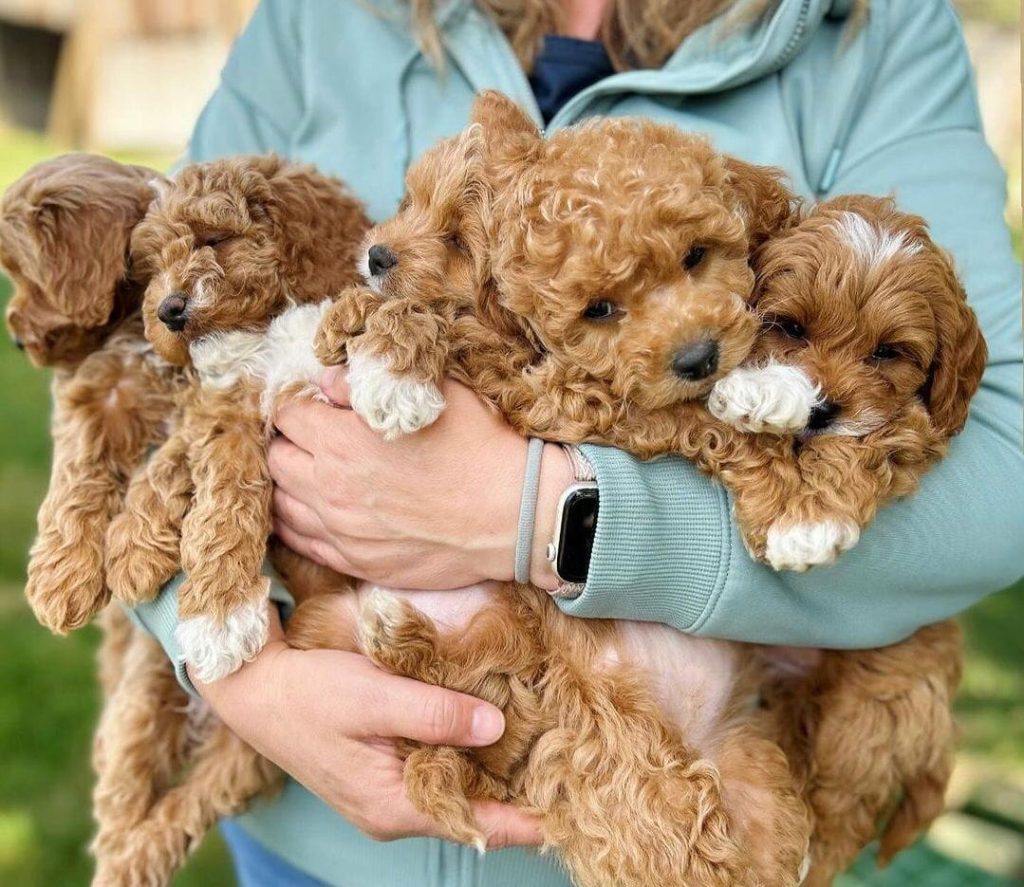Choosing The Perfect Cavapoo Breeder
Choosing the right Cavapoo puppy breeder is a critical step in ensuring you bring home a healthy, well-adjusted puppy. Here are detailed notes on what to look for and the steps to take when selecting a Cavapoo breeder:

1. Research and Background Checks
Breeder Reputation
- References and Reviews: Start by researching breeders online and checking reviews, testimonials, and references. Speak with previous customers to learn about their experiences and the health and temperament of their puppies.
- Word of Mouth: Ask for recommendations from veterinarians, local dog trainers, or breed clubs. Personal referrals can be a reliable source of reputable breeders.
Breeder Experience
- Years in Breeding: Look for breeders with several years of experience in breeding Cavapoos or other similar breeds. Experienced breeders are more likely to have a deep understanding of the breed and its specific needs.
- Knowledge of the Breed: A good breeder should have extensive knowledge about Cavapoos, including their temperament, potential health issues, grooming needs, and training requirements. They should be able to answer all your questions confidently.
2. Health and Genetic Testing
Health Testing of Parents
- Genetic Screening: Ensure that the breeder conducts genetic testing on the parent dogs for common hereditary conditions in both Cavalier King Charles Spaniels and Poodles. These may include testing for Mitral Valve Disease (MVD), hip dysplasia, Progressive Retinal Atrophy (PRA), and patellar luxation.
- Certificates and Documentation: Ask for documentation of the health tests performed on the parent dogs. A reputable breeder will provide health certificates or test results to verify the health of the breeding stock.
Puppy Health Guarantees
- Health Guarantee: Reputable breeders typically offer a health guarantee for their puppies. This guarantee should cover any serious genetic or hereditary conditions for a certain period after purchase, typically ranging from one to two years.
- Veterinary Care: Ensure that puppies receive regular veterinary care, including vaccinations, deworming, and initial health checks before they go to their new homes. The breeder should provide records of all veterinary visits.
3. Breeding Practices and Environment
Breeding Practices
- Ethical Breeding: Look for breeders who follow ethical breeding practices, including breeding only healthy dogs, not overbreeding, and ensuring the well-being of both the puppies and the breeding dogs.
- Avoiding Puppy Mills: Be cautious of breeders who have a large number of litters available at any given time or who prioritize quantity over quality. These may be signs of a puppy mill or a commercial breeder focused on profit rather than the welfare of the dogs.
Living Conditions
- Clean and Safe Environment: Visit the breeder’s facility to inspect the living conditions of the dogs. The area should be clean, safe, and well-maintained, with ample space for the puppies to play and socialize.
- Socialization: Puppies should be raised in a home environment where they are exposed to various sights, sounds, and people. Proper early socialization is crucial for developing well-adjusted puppies.
Parental Dog Well-being
- Care of Parent Dogs: Inquire about the well-being of the parent dogs. They should be well-cared for, healthy, and not overbred. A good breeder will retire their breeding dogs after a certain number of litters to ensure their health and quality of life.
4. Breeder Interaction and Transparency
Breeder-Client Relationship
- Open Communication: A reputable breeder should be open and willing to communicate with you throughout the entire process. They should answer your questions, provide information, and be transparent about their breeding practices and policies.
- Follow-up Support: Good breeders offer ongoing support and are available to provide advice and assistance even after you bring your puppy home. They should be interested in the well-being of their puppies for their entire lives.
Transparency
- Puppy Visitations: The breeder should allow you to visit the puppies and meet the parents before making a decision. This transparency helps you assess the health and temperament of both the puppies and the adult dogs.
- Contracts and Agreements: The breeder should provide a clear, written contract that outlines the terms of sale, health guarantees, and any responsibilities you may have as the new owner, such as spaying/neutering requirements.
5. Evaluating the Puppies
Puppy Temperament
- Observing Behavior: Spend time with the puppies to observe their behavior. They should be active, curious, and friendly. Avoid puppies that seem overly shy, fearful, or aggressive, as these could be signs of poor socialization or underlying health issues.
- Health Indicators: Look for puppies that have bright eyes, clean ears, and a healthy coat. They should be energetic and show no signs of illness, such as coughing, sneezing, or lethargy.
Matching Temperament
- Personality Matching: A good breeder will help match you with a puppy whose temperament suits your lifestyle. They should inquire about your living situation, experience with dogs, and what you’re looking for in a companion to ensure a good match.
6. Red Flags to Avoid
Unprofessional Behavior
- High-Pressure Sales Tactics: Be wary of breeders who pressure you to make a quick decision or who prioritize payment over ensuring their puppies go to good homes.
- No Questions Asked: A breeder who doesn’t ask you any questions about your ability to care for a Cavapoo or who doesn’t seem concerned about the puppy’s future well-being may not have the dogs’ best interests in mind.
Lack of Documentation
- No Health Testing: Avoid breeders who cannot provide proof of health testing for the parent dogs or who seem vague about the health background of their dogs.
- No Contracts: If a breeder doesn’t offer a contract or health guarantee, it’s a sign that they may not be committed to responsible breeding practices.
7. Cost Considerations
Price Range
- Market Price: Cavapoos from reputable breeders typically cost between $2,000 and $4,000, depending on factors like location, breeder reputation, and the specific lineage of the parents. Be wary of prices that are significantly lower, as this could indicate unethical breeding practices.
- Included Services: The price should reflect the quality of care, health testing, and socialization provided. Some breeders may include additional services like microchipping, initial training, or a starter kit with the puppy.
Deposits and Payments
- Deposit Policies: Most breeders require a deposit to reserve a puppy. Ensure that the deposit is refundable or transferable under certain conditions, such as if the puppy is found to have health issues or if you change your mind before the puppy is ready to go home.
- Payment Plans: Some breeders offer payment plans or options to help manage the cost. Make sure any financial agreements are clear and in writing.
8. Final Steps
Prepare for the Puppy
- Puppy-Proofing: Once you’ve chosen your breeder and puppy, prepare your home for the new arrival by puppy-proofing, purchasing supplies, and setting up a safe space for them.
- Transition Support: Ask the breeder for a feeding schedule, advice on transitioning the puppy to your home, and any tips on continuing their socialization and training.
Conclusion
Choosing a Cavapoo breeder requires careful research, attention to detail, and a commitment to finding a responsible and ethical source. By following these guidelines, you can increase the likelihood of bringing home a healthy, well-socialized puppy that will be a loving and loyal companion for years to come.












